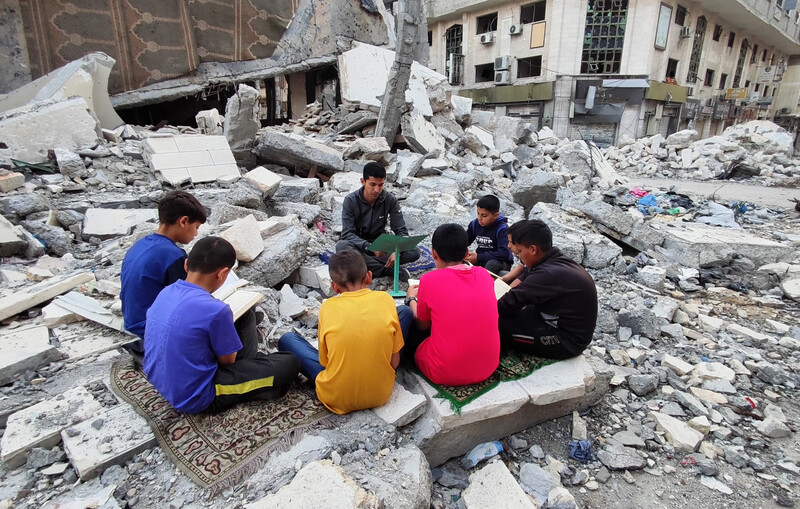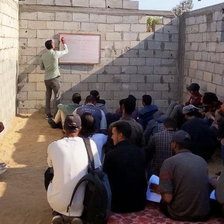The Electronic Intifada 26 September 2024

A group of children read in the rubble of a mosque in Gaza City on 23 April, 2024.
APA imagesIn the heart of Gaza, where war shows no mercy, students battle not just for survival, but to attain their education goals.
I know. I am one.
With constant electricity outages and a scarcity of study materials, I had to rely on my smartphone to download books in PDF format. I would sit in a corner of a tent, trying to summarize the information by the light of my phone, fearing the helplessness once the battery ran out.
I had taken the phone to a charging point, paying 2 shekels (53 cents) each time. Although the amount seems small, it’s a significant financial burden for me.
Still, I buy an internet card for 4 or 5 shekels and start downloading my books and lectures. Yet, the internet might go down, interrupting my studies. This struggle has made me appreciate the value of education more than ever. Despite all these challenges, I began my final exams with unwavering determination, committed to excelling.
Studying in a tent is like playing chess on a bustling street. Rather than being distracted by traffic and loud voices, however, it is the sounds of bombings and drones buzzing that divert the attention and dial up the anxiety.
To be a student in Gaza is to be constantly on the lookout: For safe shelter, for clean water. For food. We also have to battle malnutrition, affecting our ability to concentrate and our academic performance.
There is no such thing as a quiet moment to study.
The internet is our lifeline, but one that is frequently cut off. Each time the internet goes down, it feels like another door closing in our faces. It becomes difficult to access information, and communicating with professors for guidance is a challenge in itself.
Sometimes, internet outages lead to exams being postponed or conducted unfairly, adding to our mental strain. Nevertheless, we try to adapt by organizing our time better and sharing study materials with each other, defying the obstacles that stand in our way.
Exam amid bloodshed
My friend Shahd often sits beside me while trying to charge her phone.
“Sometimes, my dreams of education slip further away when I can’t collect enough money to charge my phone,” she said one day.
Another student, Maram, added that she has to take regular pauses to accommodate her sister: “My sister often needs to use my phone for her studies or to take one of her exams, which increases the pressure on us.”
Amal, on the other hand, had recently overcome one obstacle.
“I was lucky,” she said with a smile. “I found some old candles that I and my siblings can defy the darkness with knowledge.”
Like many students in Gaza, Abu Ahmed was caught out on the day of his final exams, when the internet in his place of displacement was down.
He and some friends headed to a former cafe now selling internet access far from their tents.
“What matters is that we give our best and leave the rest to God. This is our only chance,” Abu Ahmed told The Electronic Intifada he had told his friends.
But life in Gaza is never predictable.
While taking the exam, a loud explosion stunned everyone and screams of panic filled the air. A drone had targeted a car parked in front of the cafe. The place filled with smoke and screams.
Abu Ahmed saw some of his fellow students hurt. One was martyred and two others were severely injured.
In just moments, their dream had turned into a nightmare.
Despite it all
“I can’t forget how the bread that fell from a passerby’s hand was stained with the blood of the martyrs,” Abu Ahmed said later.
He returned to his tent, burdened with grief.
How could he continue?
How could he focus on his studies under these circumstances?
Yet he knew he had to keep going, not just for himself, but for the friends he lost and for Gaza, which defies pain with hope.
And thus we stay steadfast and determined. We study under the shadow of war and genocide. We read in the darkness and write while hungry. But we don’t give up.
This struggle will only make us stronger. Education is our weapon against ignorance and darkness.
Abu Ahmed, Shahd, Maram, Amal and every other student in Gaza deserve the chance to learn away from the horrors of war.
But their determination to continue and to improve themselves represent hope for a better tomorrow.
Jannah Ahmad Abu Sitta is a writer in Gaza.




